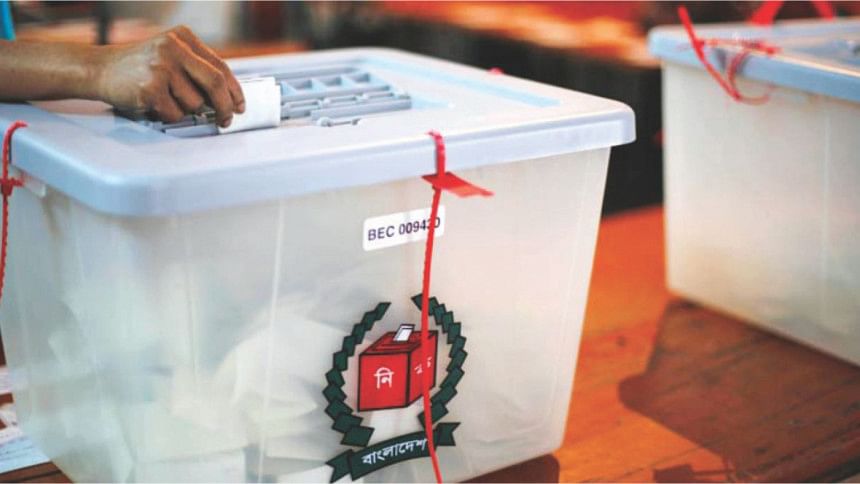No Vote: Society's barometer

Sohana Islam, who works in the advertising sector, did not vote during the National Elections in 2014. And there is a good chance, she says, that she may not vote in 2019 either.
“Why should I vote for someone if I don't want that person to come to power? If I don't like any of the representatives of my constituency, I would rather stay at home and not do anything. This is the only way I can protest,” says Sohana.
While the argument put forward by Sohana and many others with a similar issue is understandable, their decision to abstain from voting does not, on paper, reflect that that they are unhappy with the status quo.
After all, your decision to not vote could depend on a number of aspects. You could be sick, you probably might not be in town, you could simply not care… the list goes on. Protesting against your constituencies' representatives could just be one of those many reasons behind the decision to not vote.
And that's the reason why the Civil Society earlier this month requested the Election Commission, which is gearing up to host the National Elections in 2019, to include the No Vote system this time around.
While members of the civil society admit that the reinstatement of the No Vote system—it was previously used in 2008—may not make a huge difference as far as the results of the elections are concerned, it will, however, stay true to the principles of democracy and give the people of Bangladesh more freedom to express themselves in 2019.
It's an option that voters may choose if they don't want to vote for any of the candidates representing their constituency. It's a system that is in place in India and several other countries, where people can vote for the None of the Above (NOTA) option.
If the number of people voting for NOTA is substantial then various steps are taken. Sometimes the next highest contender is given the constituency or else new elections take place.
Local governance specialist Tofail Ahmed believes that had the provision for No Vote been present in 2014, 153 members would not have been elected uncontested in the country that year. “Firstly, the No Vote has been there for a long time in countries like India and other states, so no one can dismiss this as a new concept. The candidate selection process in our country is as such that voters generally have a sense of dissatisfaction. But there is no scope to express that. That's why the No Vote system can be a good tool for the otherwise powerful, unorganised masses. They can say that they have no confidence in the candidates,” says Tofail.
CPD Distinguished Fellow Dr Debapriya Bhattacharaya explains that the concept of the No Vote system arose following countrywide meetings in 2005, adding that the proposal of including the No Vote system in the elections should not be thought of as something that has arisen because of the Dhaka-based civil society. It has its origins based on a very democratic process.
“In 2005 we had gone to 17 districts and had many discussions across cross-sections. In these discussions, the No Vote option came out very strongly as a way of plugging the loopholes of our democratic dysfunctional practices,” he says. “If you really are not satisfied by the nomination then instead of abstention, which is a passive way of participation, we wanted citizens to be active and go to the polling booth instead of sitting at home.”
Dr Bhattacharaya points out that it is unlikely to make a big differene to the numbers—less than two percent of the people voted for No Vote in 2008.
In a similar vein, noted Educationist Syed Manzoorul Islam believes that the No Vote system can act as a barometer for our society. “You can measure your actual position in the electorate through this system. Voters can show their no confidence and then it can work as a reminder for the party to take care of our policies. The result will not matter, but it could point out the gaps that we do not know about. Those become clear,” he explains.
According to Tofail, the inclusion of the No Vote system can also help in the reselection of candidates in a particular constituency. “If more than one-third of the population votes for No Vote, new candidates should be brought up for a new election,” opines Tofail.
The demand for the reinstatement of the No Vote system comes at a time when the Supreme Court has released a verdict that highlights the apparent lack of independence of the EC. In the verdict related to the case of the 16th amendment, the Supreme Court observes that none of the succeeding governments took any step to strengthen the EC with all the powers it needs for holding a free and fair parliamentary election.
It states: “Unless the national parliamentary election is held impartially and independently free from any interference, democracy cannot flourish. In the absence of a credible election, a credible parliament cannot be established.”
The verdict further states: “As a result, our election process and the parliament remain in infancy. The people cannot repose trust upon these two institutions and if these institutions are not institutionalised to gain public confidence and respect, no credible election can be held.”
The message from both the Supreme Court and civil society is quite clear. The EC needs to gain the public's trust for the National Elections in 2019 to be succesful. And reinstating the No vote system, a tool that can only further encourage people to express themselves, can clearly be a small step towards achieving that goal.
Follow Naimul Karim @naimonthefield

 For all latest news, follow The Daily Star's Google News channel.
For all latest news, follow The Daily Star's Google News channel. 



Comments